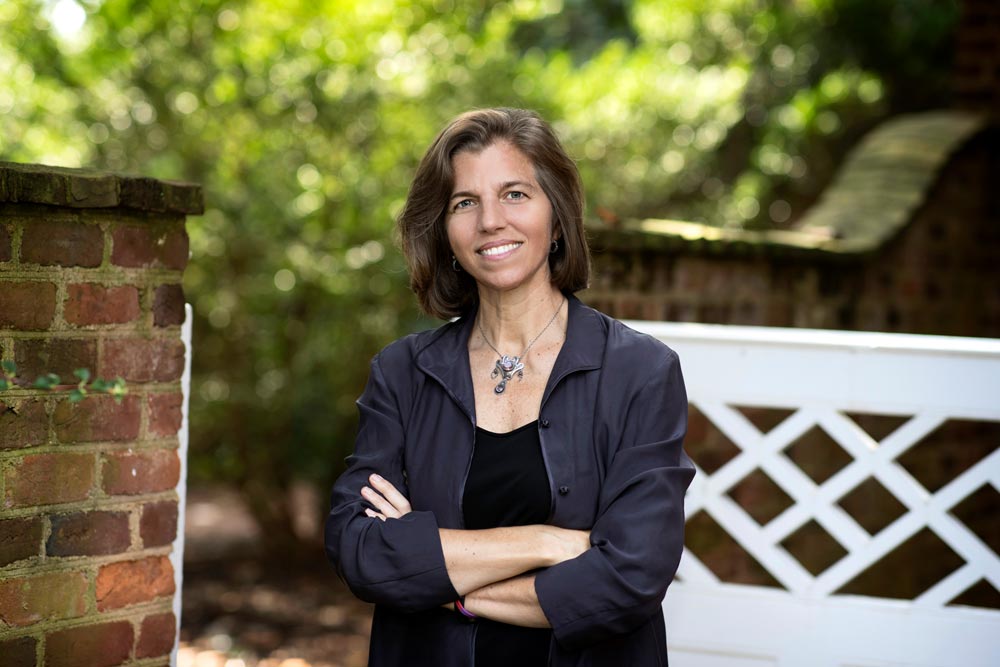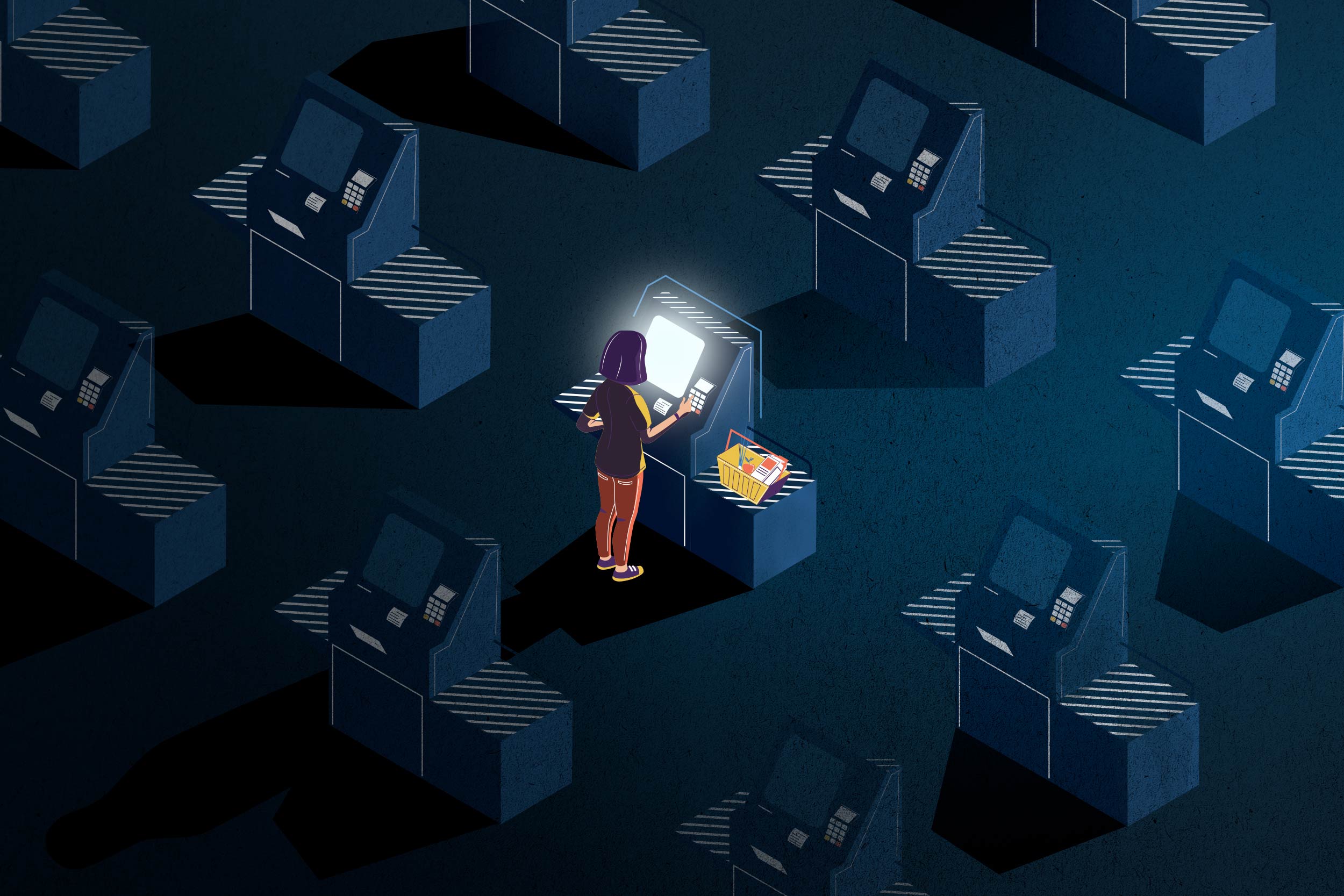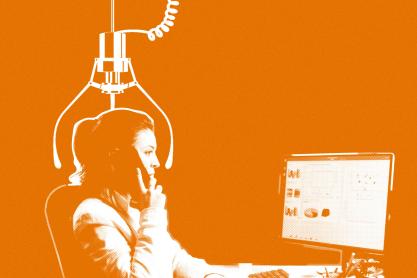Everyday interactions at the grocery store or your favorite restaurant benefit both consumers and workers, a UVA professor argues. (Illustration by John DiJulio, University Communications)
Innovations like self-checkout at the grocery store and in-app food ordering seem to make our lives easier, whether we’re beleaguered baristas or customers trying to spare ourselves an awkward interaction at the cash register.
Although these technologies may save us time and money, a University of Virginia professor argues they come at a significant cost. As consumers and business leaders strive for greater efficiency and convenience, people are losing out on valuable social interactions, sociology professor Allison Pugh contends in her new book, “The Last Human Job.”
Ahead of the book’s Tuesday release, UVA Today talked to Pugh – who also chairs the Department of Women, Gender, and Sexuality – about what we gain from talking to our hairdresser and whether we should skip the self-checkout line at the grocery store.

UVA professor Allison Pugh spent five years interviewing workers for her new book, “The Last Human Job.” (Photo by Dan Addison, University Communications)
Q. How would you define “connective labor?”
A. Connective labor is the work of seeing the other – and having someone feel seen – as part of creating value. It is the engine behind all sorts of contributions that matter, from teaching, to counseling, to healing. We don’t necessarily pay for that work; we pay for a student to learn algebra or for a patient to understand how to manage their diabetes. But connective labor is how those goals are achieved. It’s powerful, emotional, interactive work that affects both the person doing the seeing and the person feeling seen.
Q. Why is it disappearing? Are certain industries more affected than others?
A. I would say it is under siege by pressures from employers to make it more efficient, predictable and standardized, and also under threat from automation and AI.
I spent five years researching connective labor, interviewing and observing people who do it, from chaplains to teachers to therapists to hairdressers, as well as the engineers and administrators who are trying to make it more systematic. It became clear that the way we organize this work, from the resource-strapped public clinics and classrooms to the consumer-oriented corporate approaches, shrinks the time and space that practitioners have to see the other well.
I met plenty of individual heroes – workers who would put in the extra time at the end of the day, “wringing themselves out like a sponge” (as one doctor called it) – to try and be consistently present with others. But some organizations don’t have to rely on the individual hero and make a priority of relationship from the get-go; one chapter in the book identifies how they do that.
Q. How do we benefit from connective labor?
A. Connective labor comes with a lot of benefits. One benefit is widely recognized, even by the engineers who are trying to automate this work. It is common knowledge among them that humans provide “motivation” to other humans, and that is why they sometimes build in human contact at various points in their apps or programs.
But connective labor also helps to generate human dignity in the other, and to promote self-understanding. Whenever I identified a particular impact, I realized that it happened in both directions, affecting both worker and client. So clients get motivated, sure, but workers also are often suffused with a sense of purpose.
Practitioners generate dignity by seeing the other, but in doing so they come to feel their own humanity. By acting as a mirror, they help other people expand their self-knowledge, but workers also come to understand themselves better. This was one of my favorite chapters to write because the stories people told were so powerful.
Q. What can we, as workers, do to mitigate the loss of this kind of work?
A. I wrote this book to give a name to this relational work that people engage in every day, so that all of us – workers, employers and consumers – could see it, value it and make space for it.
As workers, we are often constrained by the culture and resources of our employers, so on one level how much we are able to see the other depends on circumstances beyond our control. But we can point out to our employers the costs of workplace reforms for relationship.
For example, in many workplaces from schools to clinics, the same person who is supposed to connect with others is also in charge of collecting data about the students or clients. Our heedless embrace of data analytics has often put relationships on the back burner. I hope people read this book and talk about it with their managers and peers, to help them articulate the costs of workplace policies that subordinate connecting to other goals.
Q. What can we do about it as consumers?
A. Advances in apps and AI make it seem like connective labor can be mechanized, that the gains of seeking out advice from “Woebot,” for example – 24/7 availability, the perceived freedom from human judgment – are worth the costs. But we are in the middle of what I call a “depersonalization crisis,” where the loss of connections is contributing to our social fragmentation. While we remain close to friends and family, what is dissipating are more casual relationships in civic life and commerce, and research documents that those interactions have surprising benefits for wellbeing, and, I argue, for our social fabric.
The solution that Big Tech offers to standardization is called “personalized medicine” or “personalized education,” but there are no people involved – we are being seen by machines. I wrote this book to help people see these choices as what they are: small incremental steps toward the mechanization of connective labor, contributing to the crisis of depersonalization that we all face. I hope people choose relationship, whenever and wherever they can.
Media Contact
University News Associate Office of University Communications
[email protected] 434-924-6861
Article Information
July 2, 2024






